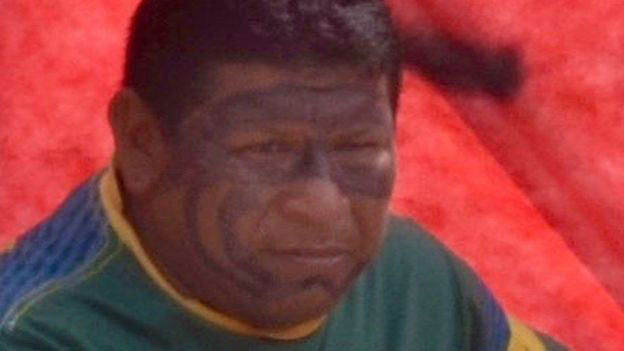Eusébio Ka’apor, 42, was an indigenous leader from Xiborendá Village (Alto Turiaçu Indigenous reserve) in the municipality of Nova Olinda in Maranhão. He was shot to dead by two unknown gunmen in an ambush when he was returning to his village in April 2015.
The Ka’apor people have fought for years against the action of loggers in their territory and demand the exit of the invaders from the indigenous areas. Since 2014, they have intensified complaints to public agencies about the offensive of loggers’ activity through meetings and letters, and have also encouraged the holding of demonstrations and protests near the indigenous village.
In August 2014, the Ka’apor people organized a great campaign within the Alto Turiaçu territory in an attempt to expel the loggers that illegally extract timber. In some areas of the territory, these loggers would approach and give alcohol to natives in order to find out the names of those who organize the action plans of defense and protection of the territory.
Before the killing of Eusébio, two indigenous individuals of the Ka’apor people disappeared, which was in relation to the conflicts between loggers and the indigenous tribe. The Ka’apor have requested action from the public entities that are responsible to solve the conflict. They also requested the public entities to fight against environmental crimes in the region but nothing happened.
Others indigenous leaderships of the village have already been threatened and even victims of murder attempts since the homicide of Eusébio Ka’ apor, and the action of the loggers continues to take place in the indigenous territory, which was ratified in 1989.
Despite suffering from the invaders offensive, the Ka’apor created an Indigenous Forest Guard for protection and management of the Alto Turiaçu Indigenous reserve — which still generates retaliation. Not only in Alto Turiaçu, but also in the Karu reserve and in the Awá-Guajá reserve — which concentrates Awa populations in a situation of voluntary isolation. Indigenous forest rangers also work in these territories. Together, these indigenous territories form, lined by areas of environmental protection and settlements, one of the last forest frontiers in Maranhão, coveted by farmers, loggers and grileiros (those who illegally take over a land with fraudulent documentation).
The Ka’apor have been chased and threatened daily due to the activity of territorial monitoring and self-protection that they promote against the action of loggers.
INVESTIGATIONS
The case of Eusébio Ka’apor was denounced internationally by organizations such as the CIMI (Missionary Indigenous Council) and condemned by international organizations such as the Inter-American Commission on Human Rights (IACHR).
However, the repercussion of the case unfortunately did not accelerate the investigation process and so far the case remains unsolved with no identified suspect of the assassination.
The Ka’por people still press for some progress in the investigations. In July 2015, they blocked a road in the region to protest against illegal logging in Alto Turiaçu Indigenous reserve and the slowness of the investigation of Eusébio’s murder. «The police give no response, they seem to be protecting the suspects. They did not invite any loggers to testify», says a leadership.
Due to the pressure from indigenous people, some public agencies have carried out some initiatives. In 2015, the Brazilian Government Agency for Law Enforcement and Prosecution of Crimes from Maranhão hosted a meeting with representatives of several villages located in the Alto Turiaçu These included; the Human Rights Commission of the Brazilian Lawyers Association in Maranhão , The Secretariat of Public Security of Maranhão, and the Secretariat of Education with the objective of hearing the indigenous leaderships about their threats and discussing problems in providing education and health services in villages.
In March 2016, the Federal Police conducted an operation to combat illegal deforestation in the Alto Turiaçu. Eleven people were arrested in the operation; seven of them in flagrant. Among these were loggers and gunmen. Besides that, fifteen sawmills that received illegally logged timber from the indigenous land were closed in the region.
However, the Ka’apor people stated that in response to this operation, the loggers invaded villages in the territory, wounded indigenous people with shots and abducted Iraúna, a Ka’apor indigenous girl, age 14, who remains missing. Threats and attacks on Ka’ apor Indians continue.
SOURCES
Cedoc Dom Tomás Balduino – CPT
Comissão Pastoral da Terra – CPT
Conselho Indigenista Missionário (CIMI)
